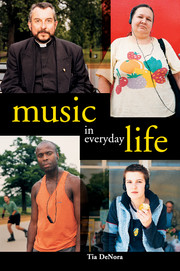1 - Formulating questions – the ‘music and society’ nexus
Published online by Cambridge University Press: 22 September 2009
Summary
Music and society – the ‘grand’ tradition
When Howard Becker published Art Worlds in 1982, his ‘art as a form of work’ perspective publicized a trend that had been developing in American scholarship since the 1970s. Known as the ‘production of culture’ approach, and developed by scholars such as Richard Peterson (1976), Lewis Coser (1978), Janet Wolff (1981) and Vera Zolberg (1990), this new perspective provided an antidote to the brand of cultural sociology that Bennett Berger cheerfully referred to as ‘culturology’ (Berger 1995). By this, Berger meant a kind of sociology devoted to the ‘reading’ of works or styles so as to ‘uncover’ or decode their social content. In Berger's eyes, the great virtue of the production approach was its ability to unhook the study of art works from the grand but often imprecise matter of associating styles of art with styles of social being and with patterns of perception and thought.
In relation to music, the most notable exponent of this ‘grand’ approach was T.W. Adorno. For Adorno, music was linked to cognitive habits, modes of consciousness and historical developments. While on the one hand, he refers to music that ‘trains the unconscious for conditioned reflexes’ (Adorno 1976:53), on the other hand, he speaks of music that ‘aid[ed] enlightenment’ (1973:15). For example, the music of Arnold Schoenberg:
demands from the very beginning active and concentrated participation, the most acute attention to simultaneous multiplicity, the renunciation of the customary crutches of a listening which always knows what to expect… it requires the listener to spontaneously compose its inner movement and demands of him not mere contemplation but praxis.
(1967:149)- Type
- Chapter
- Information
- Music in Everyday Life , pp. 1 - 20Publisher: Cambridge University PressPrint publication year: 2000



